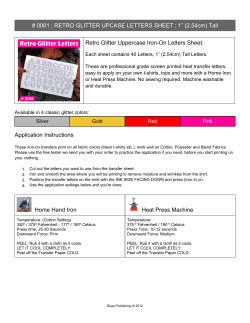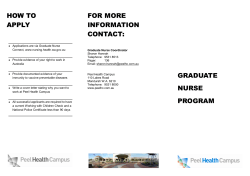
Moving Peel Kids Safely School Travel Planning
Brampton Kids on Bikes Project Workshop Results Moving Peel Kids Safely School Travel Planning Workshop Results 4/20/2015 9:30 a.m. – 12:30 p.m. Century Gardens Recreation Centre – 340 Vodden Street East, Brampton, Ontario Contact organizer: David Laing 416-402-3778 Attendees: Joanna Boudreau – Dufferin Peel Catholic District School Board, Steve Kotulak - Dufferin Peel Catholic District School Board, Yasemin Sarraf – Peel District School Board, Sharanjeet Kaur - Peel Health, Suzanne Smith – Peel Health, Catherine Sim - Peel Health, Jocelyn Cann – Peel Health, Caren Heramchuk – Peel Health, Lorenzo Melé - Peel Health, Wayne Chan - Peel Active Transportation, Erica Duque - Peel Active Transportation, Michelle Shaw -Brampton Safe City, Nelson Cadete - Brampton Infrastructure Services, Andria Oliveira – Brampton Planning, Violet Skirten – Brampton School Safety Council & Brampton Crossing Guards, Adam Nugent - Brampton Public Services, Vicky An – Eco-Schools Toronto and Region Conservation Authority, Rachel Stewart – Eco-Schools Dufferin Peel Catholic District School Board, Tracy Appleton – Eco-Schools Peel District School Board, Jacqueline Hunter – Mississauga Active Transportation, Sheelagh Duffin – Mississauga Crossing Guards, Heather Andrews – Peel Police, Deborah Wood – York Region Community and Health, Teija Cumming – York Region Community and Health, Sonia Sonita – York Region School Boards, George Mammen – University of Toronto, David Laing – Bike Brampton, Dayle Laing – Bike Brampton, Pauline Thornham – Bike Brampton, Bill McBain – Heart and Stroke Foundation, Denise De Campos – Heart and Stroke Foundation. Presentations: Introduction & Moderation by Bill McBain, Health Promotion Specialist, Heart and Stroke Foundation Brampton Kids on Bikes Backgrounder by David Laing, Chair, Bike Brampton Presentation PDF David presented highlights of the Brampton Kids on Bikes Literature Review, referenced the 10 posters around the room, reviewed the results of the December 4th workshop, joked about Elizabeth Renzetti’s timely weekend Globe and Mail column on “Get over the Stranger Danger”. He set the stage for the current workshop. Evidence on School Travel Planning: Findings over 4 years of STP Research, by George Mammen, University of Toronto Doctoral Candidate. George urged us to using existing materials to build the culture, one message at a time, funded over multiple years, using quality facilitation at multiple meetings with stakeholders from across each school community. He urged that substantial and April 20, 2015 1 sustainable results were only achieved when there was an ongoing commitment to the program over several years and that one year was insufficient to properly judge results. York Region’s Experience, by Teija Cumming, York Region Community and Health Services (Public Health Nurse) and Sonja Sonita, YRDSB & YCDSB (School Travel Planning Coordinator). Teija and Sonja reported that their ASRTS (Active and Sustainable Routes to School) Committee was formed and that success took place gradually over several years with school travel planning being included in official regional and town policies. They cited an example of success in a Markham school with a shift from 70% driving to 70% walking in the 1st 3 weeks of the program. One school in Aurora had a 93% walking rate in February. This is despite the fact that more than 35 languages are spoken in the region. They agree that housing ASRTS within healthy schools or within eco-schools can both be successful. Metrolinx highlighted their success as being an example of a “can do” attitude. Sonja and Teija concluded that it is essential to have 3 partners: the school boards, health departments and the municipalities/region. By learning from successes such as theirs, results could be reasonably expected to be achieved in a much shorter timeline. Background - December 4th workshop yielded the following: Statement of problem: Childhood inactivity is a serious issue requiring urgent priority focus Increasing student active transportation (AT) adoption has the potential to substantively address childhood inactivity Current actions in Peel Region aimed at increasing student active transportation participation are inadequate to achieve transformational change o AT is only one initiative under the healthy schools program (others are healthy eating, tobacco reduction) o Small capacity programs Walking Wednesdays Bike Rack installations School Travel Planning (STP) pilots o One-way mandate from Peel Public Health to individual schools Dependent on either in-school or parent champions Statement of Objectives: That expanding STP to all Peel Region schools is likely the most valuable first step for sustainably changing school transportation habits That the PSARTS committee has the potential to be the operational focus for STP implementation in Peel Region, but requires: o Clearer mandate o Targets and timelines supported by all key stakeholders o Representation on the committee from all key stakeholders 2 Moving Peel Kids Safely School Travel Planning Workshop Results - April 20, 2015 Strategies for achieving objectives: Changing transportation habits will require both a top-down and bottom-up strategy o Top-down Strategies Prioritization from the Ontario Ministries of Health, Education & Transportation Provincial policy mandate for schools to develop and implement STP Municipal Government bylaw support o Bottom-up Strategies Stakeholders need to create more awareness of: the AT link to academic performance the economic cost of the current situation changing public attitudes toward child risk o Change risk avoidance to risk management Stakeholders need to communicate the benefits of AT and the risks of the current situation to youth and parents Create a PSARTS sub-committee to focus on AT to schools including representatives from school boards, faith groups, students and parents Workshop #1- Consensus on Areas where teams differ from Dec 4, 2014 workshop conclusions: Previous workshop group did not have mandate or authority to define realistic targets Concern expressed over ensuring that all key stakeholders are participating in the process to enable success Objective targets were too aggressive (100% AT in 2 years) – based on ‘discussion-encouraging’ poster presented at Dec 4th workshop and currently on the workshop wall Discussion whether focus should be on elementary, secondary or both school levels (develop positive AT habits early, versus parental support for older children’s participation) Stranger-danger perception requires parent engagement & education with statistics Eco-School program is across all schools in DPCSB but in only 1/3 of PDSB – eco-schools can use active transportation to obtain eco-points, but AT is not mandated in the program Overcome the PDSB declaration of “no new mandates this year” to reflect the critical nature of this issue for the benefit of improved academic performance, health and safety School Travel Planning (STP) should be better referred to in the Dec 4th conclusions as “Active and Sustainable School Travel” (ASST) to reflect the ongoing sustainability required for success Adjust Dec 4th conclusions from “subcommittee of PSARTS” to “expand participation in PSARTS to include” to reflect the importance of the program required to effect transformational change Workshop #2 – Consensus on Steps for achieving Objectives: Active Transportation Linkages for Success: Link Targets to performance criteria to ensure a measureable success 3 Moving Peel Kids Safely School Travel Planning Workshop Results - April 20, 2015 Link Active Transportation goals to academic performance and student behaviour in the classroom, citing well-documented research and statistics, delivered with authority by educators Link Active Transportation to more effective use of school staff / administration time Link Active Transportation to more effective use of municipal staff / police traffic management time to lessen congestion, lessen road construction and lessen maintenance Link Active Transportation to better health and safety outcomes for Peel children Link Active Transportation to better environmental outcomes for all Peel residents, including children ( reduce traffic exhaust air pollution) Link school travel planning into Eco-School program and/or into Ontario Physical Education Association (Ophea, Healthy Schools Healthy Communities) Link together Healthy Schools pilot into Eco-Schools model and scoring system Education: Educate using resources from PSARTS (Peel Safe & Active Routes to School) Committee, Peel Public Health, Peel Police, and Municipal Road Safety – use the Peel’s existing School Travel Planning (STP) toolkit, teach drivers & cyclists to share the road, teach children how to ride and cross the road safely, etc. Unify the safety message amongst Region of Peel Health, Peel Police, Road Safety and various stakeholders to alleviate unwarranted safety concerns of parents Employ events to educate and achieve goals: ‘WOW’ walking & wheeling Wednesdays, car-free days, closed parking lot days, awards for students, etc. --- programs for behaviour modification coordinated through PSARTS, Peel Public Health, School boards, school principals, volunteers, municipal traffic and Peel Police Workshop Testimonial: “You changed my life after your February Brampton Kids on Bikes presentation. My kids walk to school now. I was the parent who would have driven my children to university. I want to start a walking school bus program at my kids’ school.” - Michelle Shaw, Brampton parent Next Steps: Use one common central website for active transportation information: Walk+Roll Peel Collaborative Meeting(s) amongst Peel Medical Officer of Health, School Board Directors, Superintendents and School Trustees – formalize process with key contacts identified & responsibilities outlined Requirement for School Boards to lead the collaboration, with representation from the highest levels (Directors, Superintendents and Trustees) Requirement for School Travel Planner resource person(s), with School Boards sharing resource (as done successfully in York Region), with engagement of school boards Municipal Political support – Regional Council to approve and fund long-term active and sustainable school travel planning (ASST) initiative based on STP pilot results which are scheduled to be presented to Council before end of 2015 (It was Municipal governments that created the ‘tipping point’ for the tobacco issue) 4 Moving Peel Kids Safely School Travel Planning Workshop Results - April 20, 2015 Action Items: Establish a committee to strategize on fulfilling “Next Steps”, as outlined above. Committee volunteers from workshop participants: Michelle Shaw – Brampton Safe City, Denise De Campos – Heart and Stroke Foundation, Steve Kotulak - Dufferin Peel Catholic District School Board Stakeholders from Peel Health, Peel AT, Bike Brampton, Brampton & Mississauga Traffic, Brampton & Mississauga Planning, Peel District School Board, Dufferin Peel Catholic District School Board, Brampton Safe City and Peel Police to participate in Peel Police School Safety Committee to prepare educational messages to address the goal of promoting safety for school travel while reducing congestion at the schools. David Laing, Chair of Bike Brampton to delegate to Region of Peel Council to request that Peel Region establishes a senior leadership taskforce with representation from both of the school boards, the Region and the 3 Peel municipalities. He will request that the task force mandate should define the vision for change along with bold yet achievable targets and timelines that will drive the change aggressively yet sustainably throughout the Region. [David will be delegating May 14th between 9:30am and 3:30pm. See link for agenda, once posted.] 5 Moving Peel Kids Safely School Travel Planning Workshop Results - April 20, 2015
© Copyright 2025









